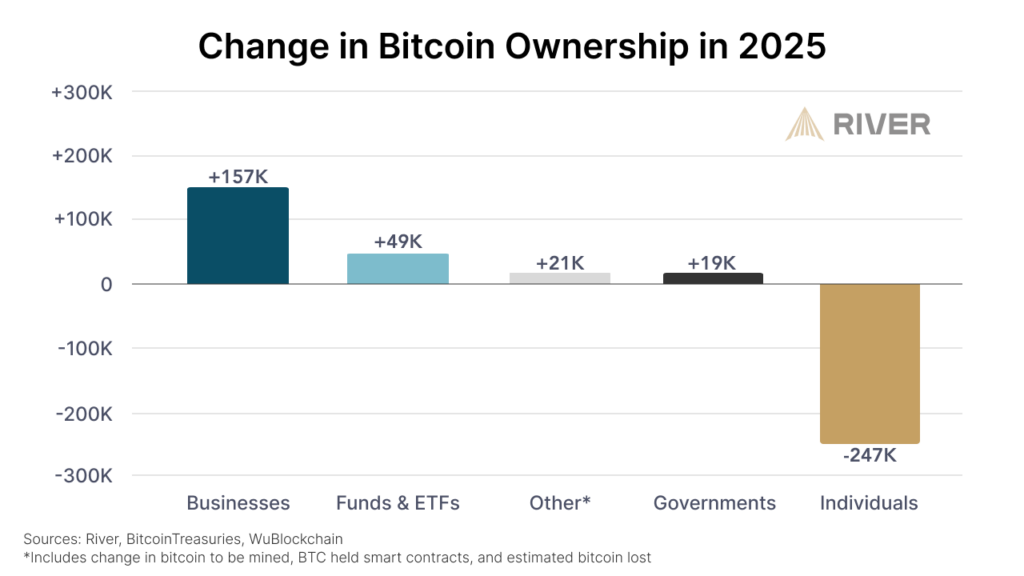Corporate Giants Bet Big on Bitcoin—Is This the Tipping Point?
Wall Street’s old guard once scoffed—now they’re scrambling for a slice of the crypto pie. Bitcoin’s latest bull run isn’t driven by retail FOMO this time. The real action? Fortune 500 treasuries loading up on BTC like it’s 2008-era T-bills.
BlackRock’s ETF approval opened the floodgates. Now we’ve got automakers, cloud providers, and even fast-food chains allocating percentages of their cash reserves to Bitcoin. The CFOs who called it ’rat poison’? Suddenly they’re blockchain evangelists—funny what a 300% ROI does to principles.
This isn’t your anarcho-capitalist Bitcoin anymore. The network’s hash rate just hit an all-time high as institutional miners plug into stranded energy assets. Meanwhile, corporate custody solutions are sprouting faster than a DeFi rug pull.
Will Bitcoin’s hard-money ethos survive its own success? The suits have arrived—and they didn’t bring pizza money.

In brief
- Companies now dominate bitcoin, surpassing ETFs, governments, and individuals.
- This massive accumulation by companies centralizes the asset, contradicting Satoshi Nakamoto’s decentralized vision.
- Bitcoin becomes a speculative treasury strategy, threatening its role as a popular and antifragile tool.
Bitcoin captured by companies: towards a crypto oligopoly?
Companies have acquired 157,000 BTC since the beginning of 2025, according to a recent study. They far exceed ETFs (49,000 BTC) and governments (19,000 BTC), while individuals have sold 247,000 BTC. This progressive centralization of Bitcoin creates a structural imbalance.
While the bitcoin protocol imposes a limited production of 450 BTC per day, massive purchases by private companies are making the available supply scarce. As these “corporate whales” lock increasing amounts of BTC, the market risks losing its initial resilience and openness.

Strategy and associates: when corporate treasury becomes speculative
The example of Strategy, which alone holds 77% of corporate acquisitions in 2025, illustrates a double-edged strategy. By converting its treasury into bitcoin, the company bets on long-term appreciation rather than fiat liquidity stability. This approach spreads to other firms like Rumble or River Financial, who justify their purchases with three main objectives:
- Diversify against flaws in the traditional financial system;
- Increase shareholder value through a deflationary asset;
- Redirect capital towards product innovation.
A trend documented by River, which claims a strong commitment to bitcoin.
Individuals drop out, companies scoop up: a turning point for bitcoin?
As companies strengthen their positions, individual investors withdraw from the market. This dynamic reveals a growing gap between two approaches to investing in bitcoin. Increased volatility, post-halving price rises, and macroeconomic uncertainties have led many small holders to secure their profits.
Meanwhile, companies accumulate at an industrial pace. This retail disengagement raises a fundamental question: can we still talk about a popular, accessible, and antifragile asset when large holders dictate the trend?
What bitcoin has become… opposite to Satoshi Nakamoto’s vision
In the original WHITE paper, Satoshi Nakamoto presents bitcoin as a peer-to-peer monetary system, without intermediaries, allowing each individual to become their own bank. The goal was to disintermediate finance, in direct response to systemic abuses by large institutions.
However, massive holding of Bitcoin (BTC) by companies introduces:
- A recentralization of monetary governance, with increased power to the wealthiest;
- An access gap, with individuals marginalized in asset accumulation;
- A risk of market manipulation by these “corporate whales” with unlimited resources.
This therefore goes against the ideal of a decentralized, egalitarian, and free network as conceived by Nakamoto. Bitcoin remains technically decentralized, but economically, it is becoming increasingly centralized.
Bitcoin changes face: from a libertarian asset held by the people, it becomes a strategic reserve in the hands of companies like Metaplanet, which surpasses El Salvador in BTC and now aims for 1% of the crypto market. This centralization shifts market balance. Can bitcoin remain a tool of individual sovereignty in the face of rising corporate interests? The debate is still open.
Maximize your Cointribune experience with our "Read to Earn" program! For every article you read, earn points and access exclusive rewards. Sign up now and start earning benefits.

